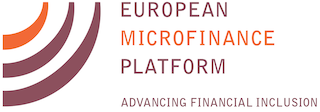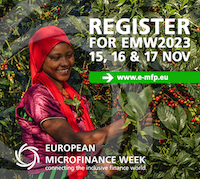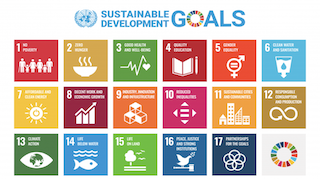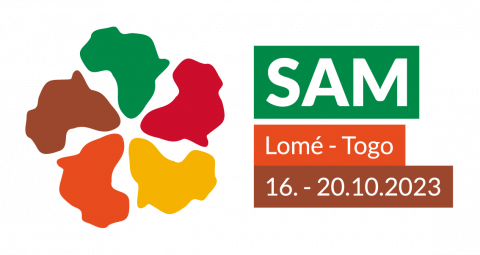The European Bank for Reconstruction and Development (EBRD), a UK-based multilateral development institution, recently announced it will loan USD 2 million in local currency to Microfund for Women (MFW), a microfinance institution in Jordan, to support female entrepreneurs in that country.
Search Results for: refugee
SPECIAL REPORT: Uniting Refugees, Locals via Lending Groups: European Microfinance Week Opens in Luxembourg
Among today’s opening meetings of European Microfinance Week was a working session on the financial inclusion of refugees that was organized by the US-based nonprofit Social Performance Task Force (SPTF) and the Luxembourgish nonprofit European Microfinance Platform (e-EMP). Lene Hansen, a consultant to SPTF, offered evidence to counter some of the common misconceptions discouraging microfinance institutions (MFIs) and their funders from serving refugees. Key among these is
MICROCAPITAL BRIEF: Kaah Express, Silatech, American Refugee Committee (ARC) to Launch Kaah Islamic Microfinance Services in Somalia
Kaah Express, a US-based international remittances company, reportedly has partnered with Silatech, a Qatar-based enterprise focused on increasing employment and entrepreneurship among youth in the Middle East and North Africa, and the American Refugee Committee (ARC), a US-based nonprofit that offers humanitarian aid across the globe, to create Kaah Islamic Microfinance Services (KIMS), a commercial microfinance institution (MFI) in Somalia.
MICROCAPITAL BRIEF: American Refugee Committee (ARC) Sells Liberia-based Liberty Finance to DCRB Investments
The American Refugee Committee (ARC), a US-based nonprofit that provides humanitarian assistance in Africa, Asia, Haiti, and the Middle East, recently announced that it has sold its Liberia-based microfinance institution, Liberty Finance, to DCRB Investments (DCRB), a private investment company based in Liberia.
MICROCAPITAL BRIEF: Silatech, American Refugee Committee (ARC), Kaah Express to Offer Microfinance in Somalia
Qatar-based Silatech, a social enterprise that seeks to promote youth entrepreneurship and employment in the Arab world, and the American Refugee Committee (ARC), a US-based nonprofit that provides humanitarian assistance in Haiti, Asia, the Middle East and Africa, are partnering with Kaah Express, a US-based for-profit money transfer company, to introduce a new microfinance program in Somalia.
MICROFINANCE PAPER WRAP-UP: “Building Livelihoods. A Field Manual for Practitioners in Humanitarian Settings – Microfinance Interventions”, Published by The Women’s Refugee Commission
By The Women’s Refugee Commission, May 2009, 36 pages, available at: http://www.womensrefugeecommission.org/docs/livelihoods_manual.pdf
This report describes the benefits of providing microfinance programs to displaced people as well as the potential mistakes of poorly planned interventions. It also recommends ways of including age-, gender-, ability- and conflict-sensitive approaches in such microfinance programs. Finally, it provides resources for developing interventions, mapping the needs of a targeted population and creating guidelines for monitoring and evaluation. This summary focuses on the “Microfinance Interventions” chapter of the report, which is part of the livelihood interventions section of the report. The two other sections of the manual are: non-intervention guidance and “Tools and Approaches”.
MICROCAPITAL BRIEF: South Korea Unification Ministry, Smile Microcredit Bank to Provide Microfinance Loans to North Korean Refugees
The South Korean Unification Ministry recently launched a microfinance scheme in collaboration with Smile Microcredit Bank to provide business loans to North Korean refugees.
NEWS WIRE: Venezuelan Government Expands $25M in Microcredits to Colombian Refugees
Source: Relief Web
MICROCAPITAL STORY: United Nations High Commissioner for Refugees (UNHCR) Signs $700,000 Agreement with Venezuelan Microfinance Institution Banco del Pueblo Soberano
According UNHCR (United Nations High Commissioner for Refugees) spokesperson William Spindler at a press briefing at the Palais des Nations in Geneva, the UNHCR has signed an agreement worth USD 700,000 with Venezuelan microfinance institution (MFI), Banco del Pueblo Soberano. The grant will be used by the bank to distribute micro-credits to about 10,000 Colombian refugees and asylum seekers in Venezuelan border states of Zulia, Táchira and Apure, and some 200,000 unregistered Colombians who are seeking international protection in Venezuela from civil conflict.
MICROCAPITAL BRIEF: 3k Displaced Persons, Returnees, Hosts Access Loans, Guarantees, Business Training in Iraq
 The UN’s International Labour Organization (ILO) and the Central Bank of Iraq have partnered with the Iraqi Company for Bank Guarantees and three commercial banks over the past two years to provide a range of services to forcibly displaced people, returning refugees and host communities in the Dohuk and Ninewa regions of Iraq. These services include
The UN’s International Labour Organization (ILO) and the Central Bank of Iraq have partnered with the Iraqi Company for Bank Guarantees and three commercial banks over the past two years to provide a range of services to forcibly displaced people, returning refugees and host communities in the Dohuk and Ninewa regions of Iraq. These services include
SPECIAL REPORT: Financial Inclusion of Forcibly Displaced Persons (FDPs), Host Communities Results in Competitive PAR Ratios #EMW2023
 The Grameen Credit Agricole Foundation recently carried out a pilot project in Uganda engaging financial services providers (FSPs) in serving refugees and their host communities. The goal is to support FSPs in adapting their products to the needs of forcibly displaced persons (FDPs) – “adapting” because new products are not generally needed – and rolling them out to prove the business case for serving these populations. Despite early reluctance from FSPs, their portfolio-at-risk ratios turned out to be under 5 percent – sometimes better than their overall portfolios. As a result, two of the foundation’s FSP partners have
The Grameen Credit Agricole Foundation recently carried out a pilot project in Uganda engaging financial services providers (FSPs) in serving refugees and their host communities. The goal is to support FSPs in adapting their products to the needs of forcibly displaced persons (FDPs) – “adapting” because new products are not generally needed – and rolling them out to prove the business case for serving these populations. Despite early reluctance from FSPs, their portfolio-at-risk ratios turned out to be under 5 percent – sometimes better than their overall portfolios. As a result, two of the foundation’s FSP partners have
MICROCAPITAL BRIEF: Liberation Community Finance Expanding Branch Network, Product Lineup for Farmers, Women, Youth in Uganda
 Liberation Community Finance (LCF), a microfinance institution (MFI) in Uganda, has several new initiatives:
Liberation Community Finance (LCF), a microfinance institution (MFI) in Uganda, has several new initiatives:
– a partnership with Uganda’s Agricultural Business Initiative (aBi) to develop environmentally sensitive financial products for LCF’s clients who farm crops such as maize and pumpkins;
– a Women Commander model through which women who borrow in groups can earn commissions for monitoring loan repayments and recruiting additional borrowers; and
– a partnership with Uganda’s
SPECIAL REPORT: European Microfinance Week 2023 Is Almost Here! A Tour of the Upcoming Conference’s Sessions and Streams
 European Microfinance Week (EMW) 2023, taking place in Luxembourg from 15-17 November, is fast approaching! One of the sector’s premier knowledge-sharing and networking events, EMW welcomes more than 500 professionals, in-person and online, and this year will comprise over 40 sessions – plenaries, breakouts, closed-door roundtables and Action Group meetings – organised across several thematic streams. These include: ‘Inclusive Finance for Food Security & Nutrition’, Green and Climate-smart Finance, Refugees and Forcibly Displaced Persons, Digitalisation, Investing, Financial Health, Client Protection, and Outcomes & Impact, among others. Here is a selection of what attendees can expect:
European Microfinance Week (EMW) 2023, taking place in Luxembourg from 15-17 November, is fast approaching! One of the sector’s premier knowledge-sharing and networking events, EMW welcomes more than 500 professionals, in-person and online, and this year will comprise over 40 sessions – plenaries, breakouts, closed-door roundtables and Action Group meetings – organised across several thematic streams. These include: ‘Inclusive Finance for Food Security & Nutrition’, Green and Climate-smart Finance, Refugees and Forcibly Displaced Persons, Digitalisation, Investing, Financial Health, Client Protection, and Outcomes & Impact, among others. Here is a selection of what attendees can expect:
‘Inclusive Finance for Food Security & Nutrition’ is the topic of the European Microfinance Award 2023, the €100,000 prize awarded annually by the Luxembourg Ministry of Foreign and European Affairs, which this year seeks to highlight innovations by financial services providers (FSPs) to safeguard access to quality and affordable food for vulnerable populations and to increase resilience of food systems. EMW2023 attendees will be able to choose from a range of sessions addressing the different dimensions of food security, including:
- An opening plenary to kick off this session stream, which will bring together different perspectives from key stakeholders to address holistically the current challenges in the field and discuss the role of FSPs in food security and building sustainable food systems;
- Creating Supportive Ecosystems to Maximize Supply of Agricultural Products Through Investments and Technical Assistance will focus on
MICROCAPITAL BRIEF: David Grimaud Named CEO of Palladium Group’s Bamboo Capital Partners
 The Luxembourg-based fund manager Bamboo Capital Partners recently selected David Grimaud as its CEO, marking the departure of Jean-Philippe de Schrevel, the company’s founder. Mr Grimaud has a background in impact investing and asset management
The Luxembourg-based fund manager Bamboo Capital Partners recently selected David Grimaud as its CEO, marking the departure of Jean-Philippe de Schrevel, the company’s founder. Mr Grimaud has a background in impact investing and asset management
MICROFINANCE EVENT: European Microfinance Week; November 15-17, 2023; Luxembourg
 This event offers discussions of topics including microinsurance, financial technology (fintech), funding mechanisms, how to serve refugees and other strategies for enhancing financial inclusion. The program includes
This event offers discussions of topics including microinsurance, financial technology (fintech), funding mechanisms, how to serve refugees and other strategies for enhancing financial inclusion. The program includes
SPECIAL REPORT: An Interview with Christoph Pausch of e-MFP on European Microfinance Week, Luxembourg & Online, November 2023
 MicroCapital: What can we expect from EMW2023, happening in-person November 15-17 in Luxembourg and online?
MicroCapital: What can we expect from EMW2023, happening in-person November 15-17 in Luxembourg and online?
Christoph Pausch: EMW2022, back in-person after two years, showed us that there is no substitute for getting the opinion leaders and decision-makers in the inclusive finance sector together in-person, ensuring they have the time and space to debate, make new connections, and of course give presentations and discuss the various challenges and innovations underway around the world.
After the success of the hybrid EMW2022, which gathered 570 attendees (including over 200 who joined us online) from 48 countries, we are delighted to return to the beautiful Abbaye de Neumunster in Luxembourg for another hybrid event, which will once again offer an exceptional networking and knowledge-sharing experience with the top experts in the financial inclusion sector. And the programme is designed to be as conducive as possible to those joining us online from different time zones. Plus, sessions will be recorded for “catch-up” after.
MC: What choices of sessions can attendees expect?
CP: As always, EMW sessions have been put forward largely by our members – so they address the sector’s current “hot topics” – and we organise them across several thematic streams. We received an enormous response to our call for proposals that went out early in the summer, giving us great scope for a fascinating, diverse program across different streams. In addition to our usual annual topic areas – digitisation, social performance, funding/investment – this year there also will be streams on refugee finance, agri-finance, a particular emphasis on
SPECIAL REPORT: The Impact of Digital Financial Inclusion on Global Development
In September 2015, every UN member country endorsed the 2030 Agenda for Sustainable Development, which comprises 17 target areas known as the Sustainable Development Goals (SDGs).
 After falling from 10.1 percent in 2015 to 8.6 percent in 2018, the global poverty rate increased to 9.2 percent in 2020 because of the COVID-19 pandemic, reversing a long trend of poverty reduction. Other headwinds such as armed conflicts, rising inflation, food insecurity, and political and social unrest also are affecting global development, and the UN estimates that these crises combined to cause an additional 95 million people to live in extreme poverty in 2022.
After falling from 10.1 percent in 2015 to 8.6 percent in 2018, the global poverty rate increased to 9.2 percent in 2020 because of the COVID-19 pandemic, reversing a long trend of poverty reduction. Other headwinds such as armed conflicts, rising inflation, food insecurity, and political and social unrest also are affecting global development, and the UN estimates that these crises combined to cause an additional 95 million people to live in extreme poverty in 2022.
On the other hand, the digital revolution has made many people’s lives easier with access to mobile phones, the internet and other tools. Digital financial inclusion (DFI) and its innovative business models have had a particularly disruptive effect, bolstering financial inclusion worldwide.
Impact on Sustainable Development Goals
DFI is enabling all types of pathways to advance the achievement of the SDGs, strengthening the link between financial inclusion and development. In 2016, CGAP and
MICROFINANCE EVENT: SAM (Semaine Africaine de la Microfinance); October 16-20, 2023; Lomé, Togo
 Themed “Inclusive and Sustainable Finance: How to Reconcile the Challenges of Socio-economic Inclusion and the Transition to a Resilient and Ecological Economy,” this sixth edition of SAM (Semaine Africaine de la Microfinance, French for African Microfinance Week) includes two days each of conference sessions, an Investor Fair and an “Innovator’s Village,” along with a gala dinner and about 20 associated events on topics such as “agricultural finance, digital finance, microinsurance and social performance.”
Themed “Inclusive and Sustainable Finance: How to Reconcile the Challenges of Socio-economic Inclusion and the Transition to a Resilient and Ecological Economy,” this sixth edition of SAM (Semaine Africaine de la Microfinance, French for African Microfinance Week) includes two days each of conference sessions, an Investor Fair and an “Innovator’s Village,” along with a gala dinner and about 20 associated events on topics such as “agricultural finance, digital finance, microinsurance and social performance.”
The conference portion of the week includes sessions titled: (1) Carbon Markets and Environmental Service Payments: New Opportunities for Local Communities; (2) Beyond Taxonomies: the Role of
